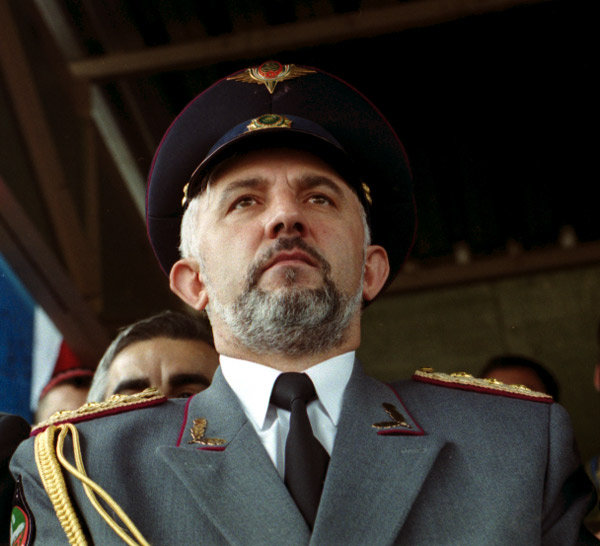STRASBOURG, June 6 (RAPSI, Ingrid Burke) - The European Court of Human Rights (ECHR) held Thursday that Russia was not responsible for the death of Aslan Maskhadov, but that its automatic refusal to return his body constituted a violation of his family’s right to respect for private and family life, as guaranteed by Article 8 of the European Convention of Human Rights (Convention).
Prior to the March 2005 discovery of his corpse by Russian security forces, militant Chechen separatist leader Maskhadov had been implicated in a variety of criminal cases, including an incursion and terror offenses.
The most infamous among these offenses was the Beslan school terrorist attack. In September 2004 a hostage crisis at a school in the town of Beslan, in the Republic of Northern Ossetia-Alaniya, culminated in the deaths of 334 people, 86 of whom were children. Maskhadov was formally named as an accused in the case after investigators collected an array of evidence his role in masterminding the atrocity.
The circumstances of his death appear to have been investigated in light of the Beslan school massacre investigation. The criminal case pending against him was subsequently dropped due to his death, despite the existence of evidence of his involvement in masterminding the attack.
The authorities chose not to pursue charges in connection with his death, finding that Maskhadov had died from gunshot wounds fired accidentally by one of the armed insurgents he had been hiding out with, in light of forensic examinations, evidence found on the scene, and witness accounts.
On March 25, 2005, Russian authorities issued a decision stating that Maskhadov and three others had been behind the Beslan terror attack. The decision noted that Maskhadov’s body had been discovered alongside homemade explosives, firearms, ammunition, and documents, which taken together confirmed his active involvement in terrorist activities that had been interrupted by his death.
Establishing that forensic examinations had been completed, the decision concluded that it was time to bury Maskhadov’s corpse.
Having established Maskhadov as a terrorist, the decision referred to two items of Russian law: the Suppression of Terrorism Act and a decree that had been passed in 2003 governing the burial of terrorists, in opting to bury the body. The decision delegated Maskhadov’s burial to the Government of the Chechen Republic.
Maskhadov’s family requested the return of his body on various occasions. In April 2005, Russian authorities rejected the request, noting that the burial of terrorists killed as a result of suppressing their terrorist activities was governed by Russian law, which stipulates that in such cases bodies would not be returned, and burial locations would not be disclosed.
Maskhadov’s family alleged that he had been trapped, detained, and killed in violation of the right to life, as guaranteed by Article 2 of the Convention. They further argued that the investigation had drawn erroneous and flawed conclusions.
The court held in Russia’s favor in this regard, finding that an investigation had been launched shortly after his death and had been prompt and conclusive in its findings.
Furthermore, the court found the claim that Russian authorities may have conspired or colluded in Maskhadov’s death unconvincing: “when conducting the search the authorities could not have known in advance whether anyone would be hiding in that cellar, let alone expect that one of them would be Aslan Maskhadov. Furthermore, the case file contains no evidence which would confirm the entry of the FSB officials of the cellar before the death of Maskhadov. Against this background, the applicants’ allegations of conspiracy or collusion involving the authorities and the former companions of Maskhadov remain speculative and implausible. Having examined the evidence in the case file and the parties’ submissions, the Court finds that there is no proof to support the applicants’ allegations that the authorities’ actions were the direct cause of the death of Aslan Maskhadov.”
The court did find by a majority of five to two a violation of the applicants' right to respect for private and family life, however, in the manner of the authorities’ refusal to return Maskhadov’s body, owing to the conclusion that it had overstepped its margin of appreciation in balancing the state’s legitimate interest in the protection of the rights and freedoms of others with the family’s rights to protection of private and family life in accordance with the Convention. According to the judgment: “In sum, having regard to the automatic nature of the measure, the authorities’ failure to give due consideration to the principle of proportionality and the absence of effective judicial supervision, the Court finds that the measure in question did not strike a fair balance between the applicants’ right to the protection of private and family life, on the one hand, and the legitimate aims of the protection of the rights and freedoms of others, on the other, and that the respondent State has overstepped its margin of appreciation in this regard… It follows that the decision of 25 March 2005 violated the applicants’ right to respect for their private and family life, as guaranteed by Article 8 of the Convention.”
Notably, the dissenting judges took issue with the idea that Russia had overstepped its margin of appreciation in terms of balancing the competing interests involved. Speaking to this point, the dissenting judges argued that the majority’s proportionality equation was hampered by the idea that Article 8 rights could be viewed as more important than the rights of others to live: “The importance of the right in question is undermined by the fact that the terrorists waived their social obligation to maintain peace and left their homes to wage war - and not merely war, but a war against civilians - and that terrorists usually sacrifice their own bodies in their attacks; the applicants must accept this from the very outset, and thus they must adjust their expectations in the light of the dramatic consequences incurred by society as a whole.”



